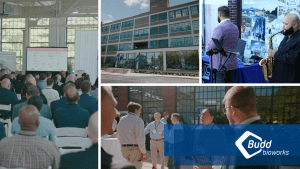
4 Vaccine and Immunotherapy Companies in Maryland That Are Redefining the Capabilities of Modern Medicine
Maryland’s World Leading Vaccine Hub Showcased at Fourth Annual MTC Life Science Breakfast
January 22, 2019
It might be cold and snowy across the DMV, but one thing is for sure—vaccine and immunotherapy companies are hot in the BioHealth Capital Region! Last week, the Maryland Tech Council (MTC) brought together local industry leaders and over 70 attendees for their annual breakfast panel discussion on current progress, breakthroughs, and challenges in vaccine and immunotherapeutic development. The discussion was moderated by renowned industry veteran, Steve Hoffman, MD, CEO and CSO, Sanaria, who was also the title sponsor for the event.

Marty Rosendale, CEO of the Maryland Tech Council, set the tone for the morning’s event for a very engaged crowd. “We started this event 4 years ago as a way for local vaccine and immunotherapy companies to update the community on their progress. Since then, it’s clear that the BioHealth Capital Region is redefining what vaccines and immunotherapeutics are, what they do, and what they are capable of.”
As highlighted here, each panelist gave an overview of their company the progress they are making in their fields. While the panelists came from
Here are the highlights from each of the presenting companies.
—
American Gene Technologies
Jeff Galvin (@jeffreygalvin) of American Gene Therapeutics (AGT) led off the panel by touching on his own personal history. “Prior to starting AGT, I worked in the technology sector in Silicon Valley. I, like many others, moved to Maryland because of the high quality of life and abundance of amazing resources, and I have pleased by my experiences here so far.”
AGT is developing genetic medicines targeting major diseases, including HIV/AIDS, Phenylketonuria (PKU) and Hepatocellular carcinoma (liver cancer, or HCC). It has three lead candidate drugs in its pipeline (all based on its proven drug-delivery platform) and a proprietary vector platform with broad applicability in immuno-oncology and thousands of other diseases. It is also eyeing a near term Phase I human trial for their HIV cure.
AGT has a unique therapeutic approach to killing epithelial cancers (breast, prostate, etc.). Rather than focusing on the typical PD-1/PD-L1 markers, AGT’s unique approach ramps up the activation of the body’s native γδ T cells. While these cells comprise only 3-5% of the total circulating T cells in the body, they are powerful immune system surveyors, constantly circulating and destroying epithelial malignancies before they become solid tumors. “To put in perspective how powerful γδ T cells are—the only reason you’re here in this room listening to us today is
Inspired by the potential of γδ T cells, Jeff and his team have developed a viral vector-based therapeutic candidate. When the drug is injected into solid tumors, the cancer cells secrete molecules that put the body’s γδ T cells into overdrive to destroy the cancer.

“This is a remarkable therapeutic with amazing potential for cancer patients. We’ve seen an 85% remission in various epithelial cancer mouse models, and there haven’t been autoimmune responses, edemas, or cytokine storms that are sometimes associated with other immunotherapeutics,” said Jeff. “Perhaps most importantly, these activated T cells continue circulating the body and destroy any metastases they come in contact with.”
So what contributes to AGT’s success? “Our whole business model is to approach problems in unique ways. Coming from a technology background, I tend to think of therapeutic development as similar to designing a new smartphone app. “The cells in your body are like “organic computers” with your DNA being their “operating system. We are able to use the DNA-delivery of modified viruses to “update” your operating system for better health. We design software “patches” that correct DNA defects, enhance cell operation, or undercut the drivers of diseases in your body. Our proprietary viral vector technologies, components, and tools form a reusable development platform, like Android or the iPhone operating system, that does the ‘heavy lifting’ of delivering new software to your DNA, so that developing new “disease-curing” apps is reliable, safe, quick, and efficient,” said Jeff.
“Most importantly, though, when you bring together smart, passionate people, you can accomplish amazing things. I think that’s the mindset that applies to the entire BioHealth Capital Region.”
—
GlaxoSmithKline (GSK)
Jeff Ulmer of GlaxoSmithKline (GSK) took the stage next. Having been with GSK for 20 years, he’s seen a lot when it comes to vaccine development. He touched on GSK’s long and rich history of vaccine work, leading to the recent opening of the Rockville R&D center.
“We considered multiple different locations, but ultimately Rockville was chosen because of the vibrant local community. You not only have a vast abundance of biotech companies, healthcare companies, and academic laboratories, but you’re also a quick drive from several major government laboratories. It just made sense to be in the heart of it all,” said Jeff.
And with GSK’s reputation as a world-renowned leader in drug development, it’s a huge testament to Maryland’s potential that Rockville was chosen to house their new R&D center.
Currently, the Rockville center’s focus is on developing vaccines against cytomegalovirus (CMV), respiratory syncytial virus (RSV) and influenza. While these viruses often don’t cause serious issues in healthy individuals, those who are immunocompromised are at greater risk of complications. More specifically, Jeff discussed two of GSK’s up-and-coming nucleic acid viral vaccines. “Traditionally, companies have used biological systems, such as bacteria and cell lines, as a means to produce drugs. While these are effective methods, you’re limited in terms of production capabilities, potential immunogenicity, etc. At our Rockville headquarters, we’re breaking away from these traditional methods to develop fully synthetic RNA viral vaccines.”

Having a fully synthetic approach to develop vaccines also means that vaccines can be developed quicker in the event of an outbreak. “Having learned lessons from the Ebola and Zika outbreaks, we’re trying to develop novel synthetic vaccines that have more of a ‘plug-and-play’ technology, where we can more rapidly develop drugs in the event of an epidemic compared to biological approaches.”
—-
Emergent BioSolutions
Following Jeff, Kelly Lyn Warfield of Emergent BioSolutions discussed the company’s approach in expanding their capabilities beyond anthrax.
“Emergent was founded 20 years ago with the goal to improve an available anthrax vaccine. Since then, we’ve become the largest provider of anthrax countermeasures for the US government and military,” said Kelly.
While BioThrax if often considered to be Emergent’s claim-to-fame, the company isn’t satisfied with stopping there. “We’re constantly looking for new ways to improve or expand our expertise. For example, we’re currently working on a 2nd generation anthrax vaccine that promotes a more rapid response, and with our recent acquisition of PaxVax we are working toward adding cholera and typhoid fever vaccines to our portfolio”
Currently, Emergent consists of roughly 1600 employees across 11 sites, with their main headquarters located in Gaithersburg, Maryland. “I’ve been fortunate to have lived here most of my life, and I can tell you that Emergent is here to grow and here to stay in Maryland,” said Kelly Lyn.
—
Sanaria:
Steve Hoffman of Sanaria closed out the panel discussion by discussing Sanaria’s resilient approach in developing a vaccine against malaria. “We’ve been around about 15 years, and our core mission has always been to fight malaria. While it’s not as much of a problem in the United States, in the past 10 days alone there have been roughly 11,000 deaths due to malaria. Compare that to the 11,000 deaths from Ebola that occurred over the span of two years, and you can see just how much of a need there is.”

Parasitic infections are notoriously difficult to vaccinate against, largely owed to the fact that as eukaryotic organisms they have a more complicated genome. These hurdles haven’t deterred Steve, though. “We have tried to make all different types of vaccines, including traditional recombinant, DNA, and RNA vaccines. When these weren’t quite working, we decided to try a completely new approach. Rather than trying to target specific genes, why not try to vaccinate against the whole parasite instead?”
Sanaria’s current candidate is a eukaryotic cell vaccine, a first of its kind. While Steve and his team had to overcome many hurdles in pioneering this new approach, their innovative strategy seem to be paying off. The vaccine has currently been administered to ~2,500 people so far, with no observable adverse events compared to normal saline. Phase 3 trials are planned for later this year, and Sanaria is already looking ahead toward building a new commercial production facility in Maryland.
—
As the discussion drew to a close, panelists reflected on biotech in Maryland and the BioHealth Capital Region as a whole. While all agreed on the need for greater risk capital and the challenges in finding C-suite talent, the panelists also felt that the Maryland ecosystem is extremely rich.
“In an up-and-coming biotech hub, you figure out unique ways to think outside the box and overcome hurdles, both when it comes to developing your product and running your business,” commented Jeff Galvin.
“You often see the BioHealth Capital Region being compared and ranked to Silicon Valley and Boston, but it’s important to remember that very rarely do great innovations come from following the status quo. That’s my philosophy in running AGT, and I think that’s the philosophy we should be following here in Maryland.”

- About the Author
- Latest Posts
Sarah Ellinwood is BioBuzz’s Managing Editor. A scientist by training and a science communicator at heart, Sarah specializes in making complex concepts understandable, engaging, and exciting. She received her Ph.D. in molecular and cellular biology with a focus in infectious disease immunology from the University of Maryland and is passionate about all things related to scicomm, peer mentorship, and women in STEM.




